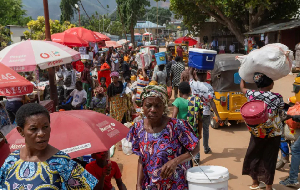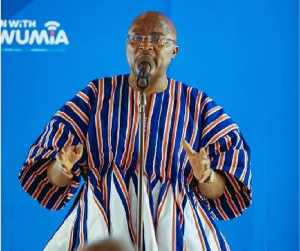By Richard Avornyotse - GNA Sports Desk
Accra, Jan 17, GNA - The Black Stars of Ghana, who were missing from the last edition of CAN in 2004 in Tunisia, having been eliminated by Rwanda in the qualifiers, made amends by topping a strong field, which included South Africa, Congo DR and Burkina Faso to gain a double berth for the 2006 World Cup and the Cup of African Nations billed for Egypt.
The Ghanaians warded off challenges from all members of the group, which also included Cape Verde and Uganda to finish as run away winners of the group with a whooping 21 point margin, as against 16 by second placed DR Congo.
Though the feat of the Black Stars was achieved under the tutelage of three coaches, it was Serbian Ratomir Dujkovic who won the hearts of all Ghanaians, as his tenure produced sparkling results for the Black Stars.
Professor Mariano Barreto of Portugal started the competition with the Black Stars but abandoned the team mid stream to return to his native Portugal to coach a premiership side.
By then, the Ghanaians had won 2-0 against Cape Verde and lost to Burkina Faso in Ouagadougou by a lone goal margin in a match that they dominated in the first half and could have won if they had been a little bit more purposeful in attack.
Hopes rose a little bit when the Stars secured a 1-1 away draw against Uganda in Kampala and spanked South Africa at home to go top of the table.
It was at this time that Barreto left and Sam Arday was drafted from his Feyenoord Academy camp to supervise the Black Stars in their next match against DR Congo. Arday made it clear that he would be available only for that match and when the home match ended in a barren draw at Baba Yara Sports Stadium in Kumasi, the heap of criticism rose drastically and Ardy bowed out on his word.
Meanwhile, the venue of matches, which used to be the Ohene Djan Sports Stadium in Accra had also been shifted to the Baba Yara Sports Stadium in Kumasi because it was bigger and Kumasi fans were more supportive than their counterparts in Accra. Officials of the Ghana Football Association explained that Kumasi offered the Stars the benefits of a home advantage because Accra fans booed the players when they faltered, while Kumasi fans were more patriotic in their support.
Then arrived Ratomir Dujkovic who had plotted the fall of Ghana when he was the head coach of Rwanda.
He guided his charges to beat Ghana by a lone goal in the final qualifier for CAN 2004 to resign Ghana to mere watchers of the tournament.
The arrival of the Serbian generated some furore, for despite his willingness to accept a "meagre 10 thousand dollars" per month, most Ghanaians felt his salary was too much and cried for the tax payer, whose money would be used to pay the coach's wages.
While the debate waged on, President John Agyekum Kufuor announced cabinet changes and swapped Kwadwo Baah-Wiredu, who was in charge of Sports with Yaw Osafo-Maafo who was then the Finance Minister.
Osafo-Maafo produced answers to the financial puzzle when his friends at EXP Momentum Ghana brokered a deal with Gold Fields Ghana Limited to support the Black Stars with three million dollars. The arrival of the Gold Fields support, which also took care of the wages of the entire technical staff of the Black Stars and the winning bonuses of the team provided the GFA with a lot of relief and the ever popular accolade of "there is no money" vanished from the corridors of the football house.
The support also took care of friendly matches resulting in a meeting between the Black Stars and Senegal in England. Every Ghanaian professional became eager to play for the Black Stars. The winning bonuses of the players, which were a 1,500 dollars was increased to 3,000 and then to 5,000 dollars and later to 8,000 dollars as the competition wore on.
Motivation was good and morale was very high in camp. Injured players were flown to South Africa for specialist attention and coach Dujkovic made sure that the high bonuses paid to him and his players were earned.
He monitored the performances of the players in their various leagues in Europe and ensured that only those who were playing regularly for their teams were invited.
He enforced camp rules and instilled a sense of high discipline and commitment in the players. The coach also was in constant touch with the coaches of his players both in the country and abroad. Governmental influence too became very high in the Black Stars camp with Ministers visiting the team regularly, anytime they assembled in Ghana for matches.
Bonuses were paid at match venues and tickets were readily available for the Europe and Asia based players to return to their bases immediately after matches.
On the field of play the Black Stars played a very tight defensive tactics, with Michael Essien and their inspirational captain Stephen Appiah playing just on top of the defence to help at the back and initiate attacks as soon as the Ghanaians regained possession.
It paid off dearly by the overall results the Stars recorded. When the second round of the qualifiers began Ghana drew only one match, a 1-1 result with DR Congo in Kinshasa. Even in that match, the Ghanaians dominated, scored the first goal and had a dozen more chances but fluffed them all and allowed the Congolese to earn a point.
In other matches of the round, Ghana disgraced South Africa 0-2 away, avenged the defeat by Burkina Faso with a 2-1 margin in Kumasi, humbled Uganda 2-0 at home and annihilated Cape Verde by an incredible 0-4 score line in Praia.
On the whole, the Black Stars recorded only a loss, three draws and six victories in the qualifiers, scoring 17 goals and conceding only four to top the table with 21 points, five clear of second placed Congo DR.
In addition to all the bonuses they earned during the qualifiers, the government rewarded each member of the squad with 10 thousand dollars as a mark of appreciation for topping the group and qualifying for the World Cup as well.
Ratomir Dujkovic has become a hero in Ghana but pessimists argue that if a Ghanaian coach had had the support the Serbian had, the results could have been better.
But maybe if a Ghanaian coach had had the same opportunities, the results would have been worse.
Whichever way one looks at it, the Black Stars are poised to make their presence felt in Egypt based on their superlative form during the qualifiers the newfound positive administrative indices from the Association, an appreciative government support and motivation from corporate Ghana.
Soccer News of Tuesday, 17 January 2006
Source: GNA












